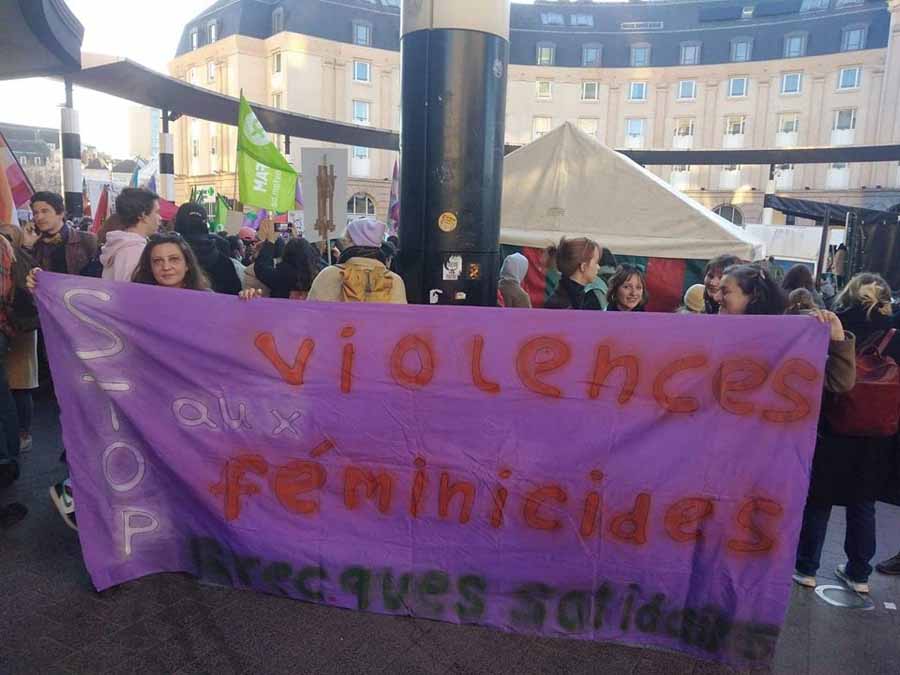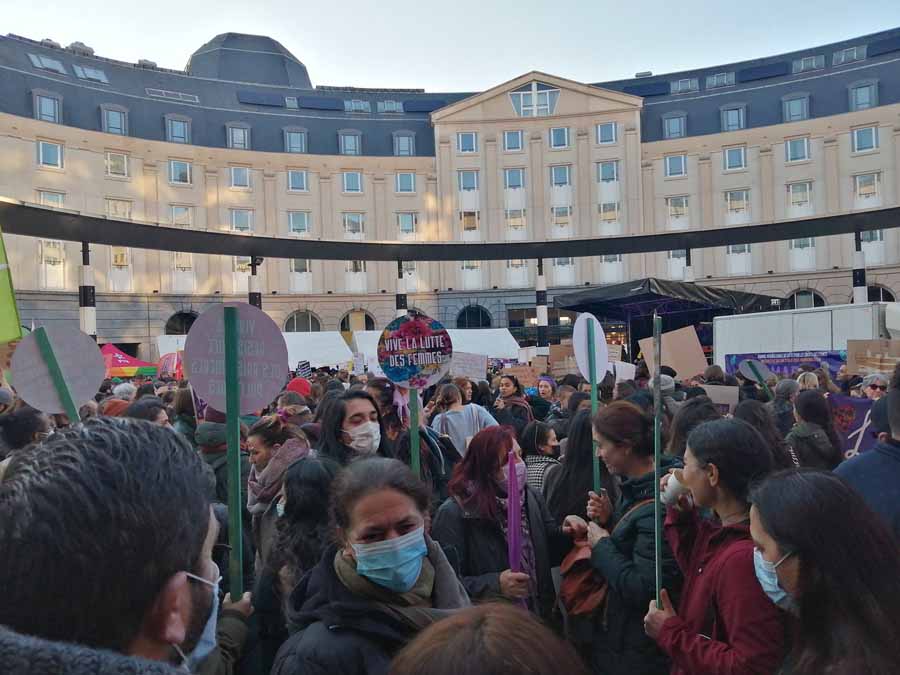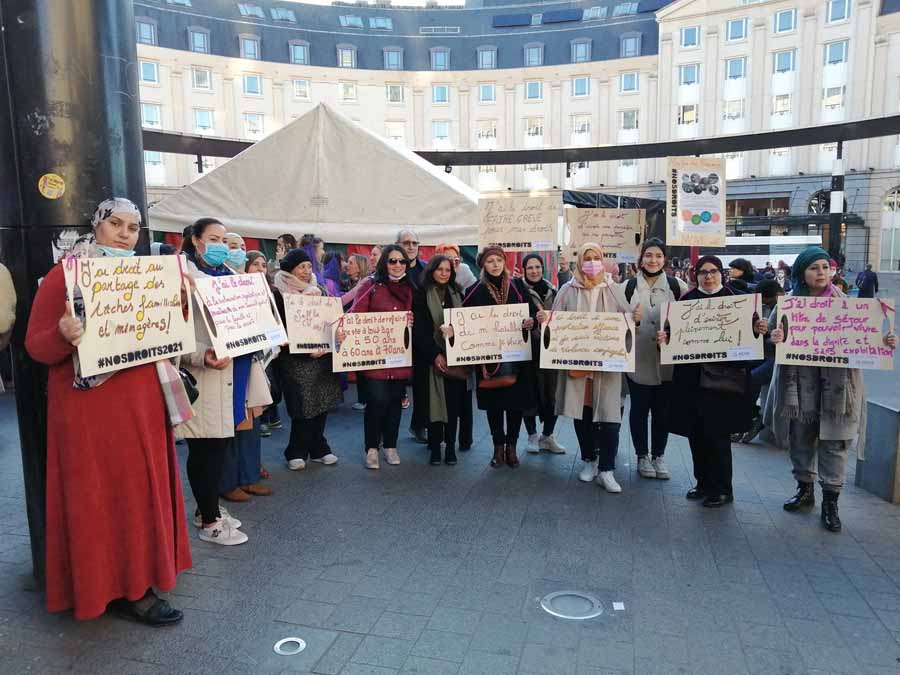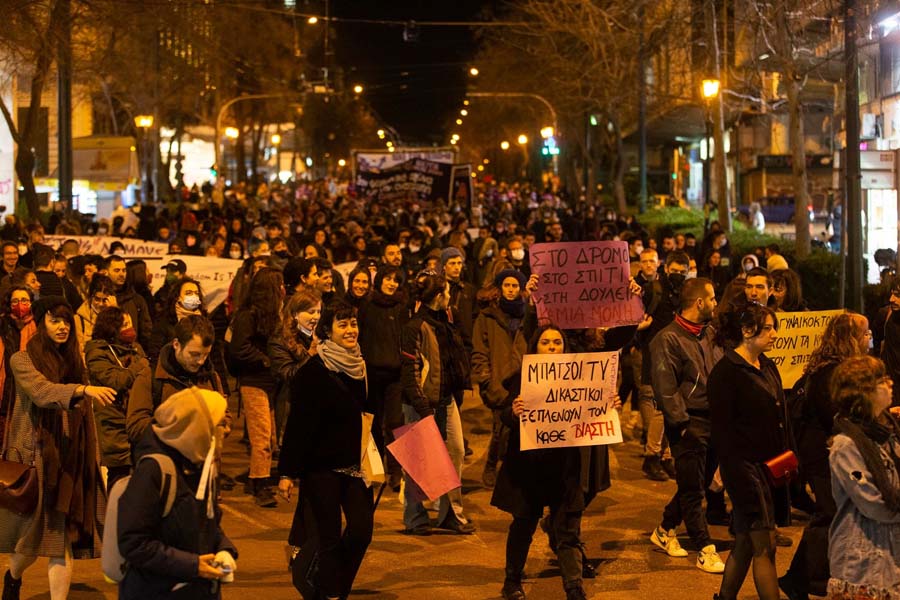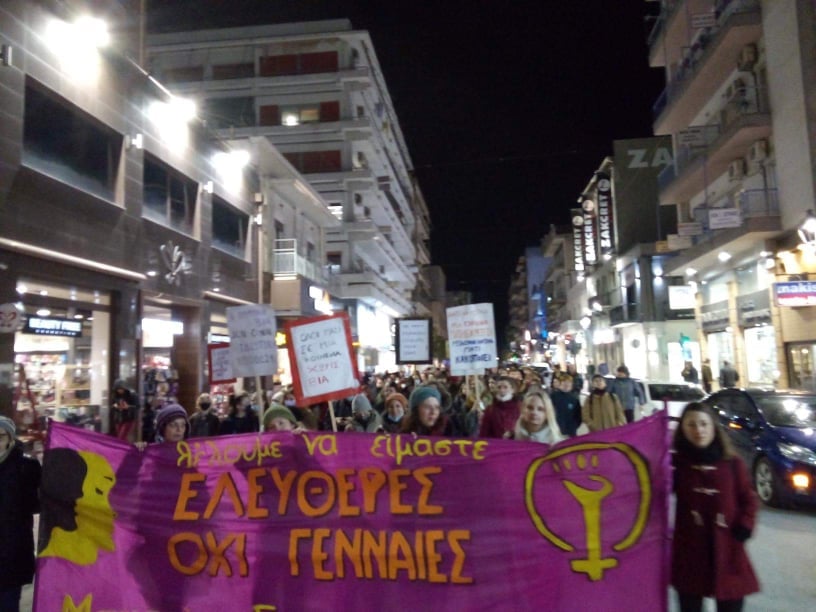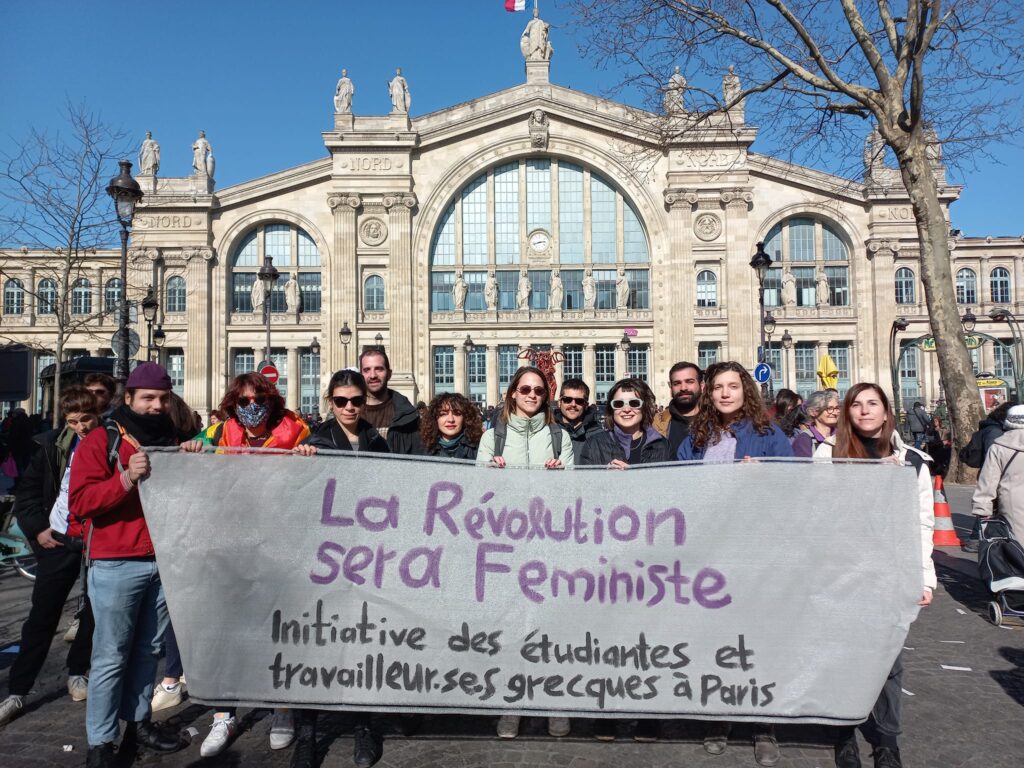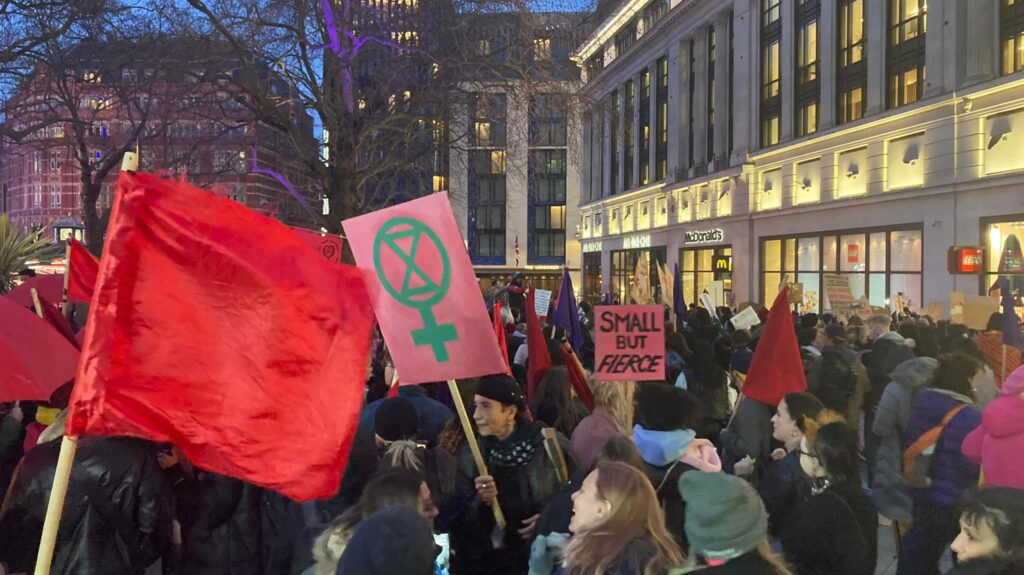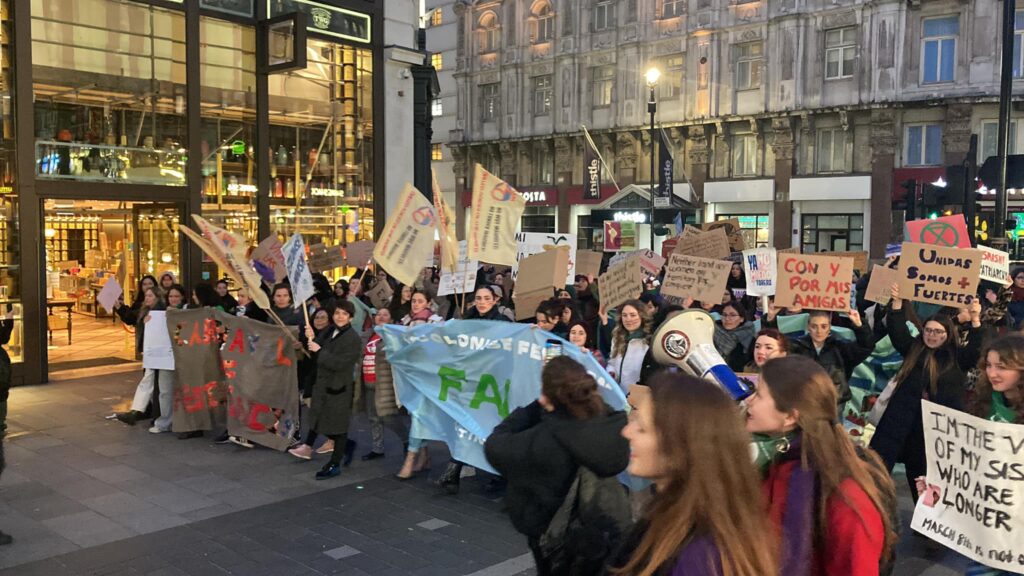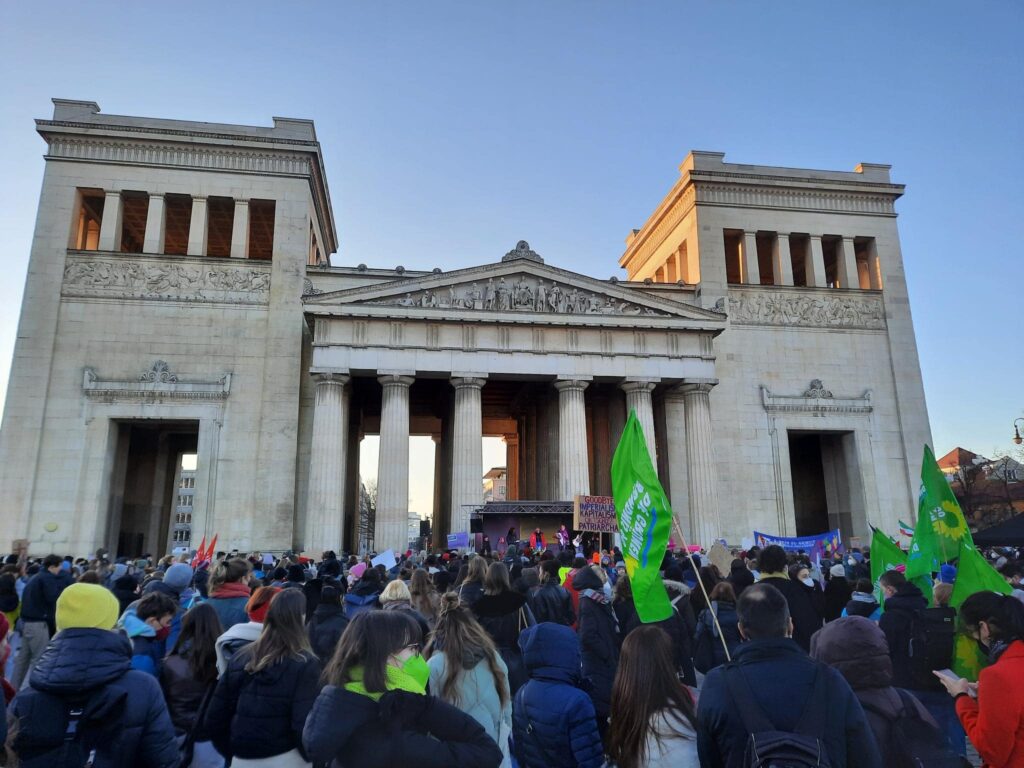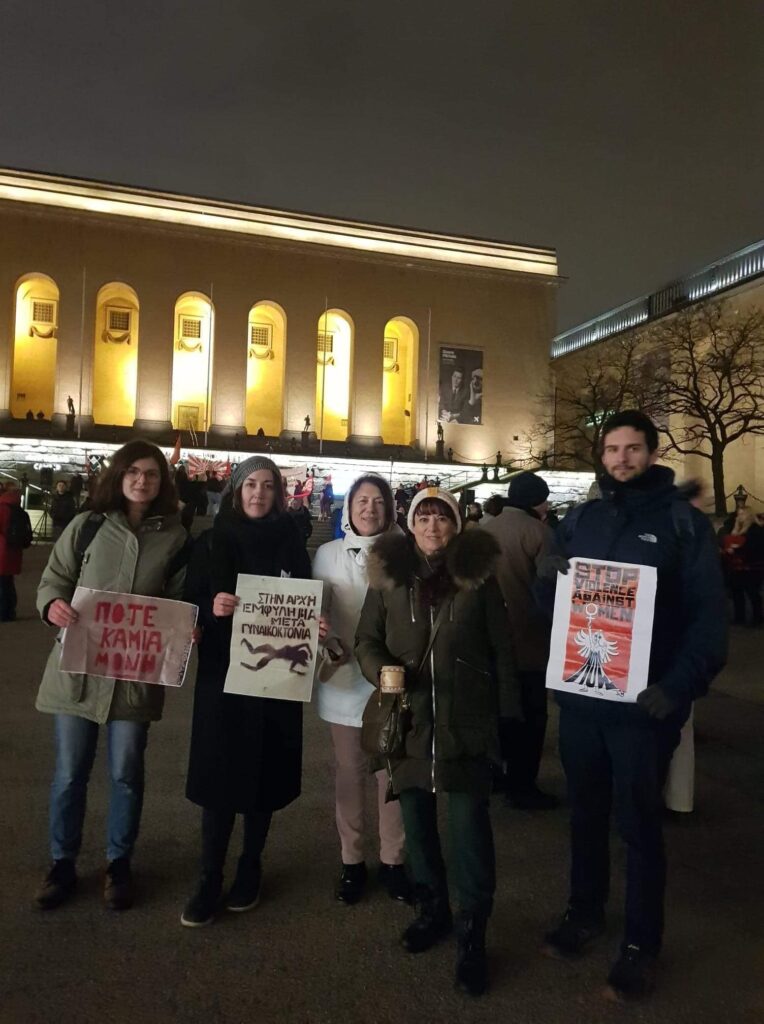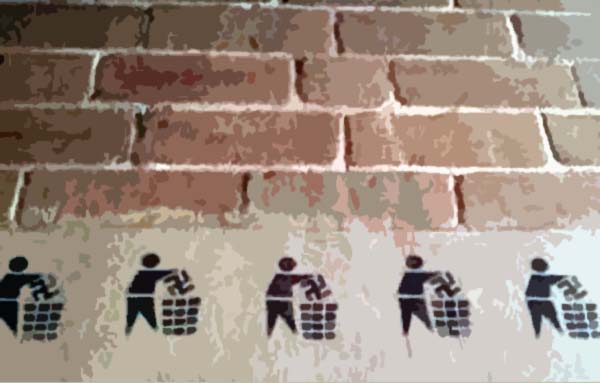In recent years, the International Women’s Day, celebrated on March 8, has become a big event in several countries. As the capitalist crises hit working-class layers and living conditions are worsening in many parts of the world, movements arise and women get more empowered and radicalised. The feminist movement has been growing stronger over the last decade and this has also been reflected in this year’s celebrations, actions and demonstrations around the 8th March.
Today we publish some reports from different parts of the world about the IWD demonstrations.
Turkey
Despite the decline faced by movements in Turkey after the 2015 coup, in recent months we have seen a revival of struggles and protests. The feminist movement was no exception to this, as women also face harsh conditions. The country has ranked 133rd out of 160 countries in the Global Gender Inequality Index in 2021.
Several demonstrations have taken place recently to protest a new law on divorce alimony, which would affect thousands of women living in precarious conditions.
Demonstrations were called over the weekend but also in the evening of March 8, next to various activities organised by trade unions, NGOs and feminist organisations (trainings, panel discussions, press conferences etc). Police brutally attacked the demonstrations and numerous women were detained in Antalya, Adana and Diyarbakır.
Several hours before the demonstration, traffic and the subway were halted in İstanbul. Despite the strict measures, thousands of women gathered around the Taksim area, in order to celebrate the 20th #FeministNightWalk. The central statement of the organisers was read in Kurdish, Arabic and Turkish, and mentioned among others: “The feminist rebellion will not end until we establish an equal and free world without patriarchy, capitalism, racism, war, occupation, religious oppression and labor exploitation! Long live our feminist struggle!”.
Another #FeministNightWalk was held in Ankara at the same time. A march was scheduled but did not take place because the police blocked it. Yet, thousands of women answered the call and filled up a square in Ankara. Despite the cold, the 18th Ankara Night Walk had many more participants than in previous years. “Feminist rebellion is a struggle for life”, was the main slogan.
Economic crisis and war were the main topics of almost all the feminist demonstrations around Turkey. It looks like these will dominate the movement’s agenda in the coming months.
Spain
Thousands of women and men marched in the Spanish State on March 8 to demand women’s rights like living in safety, decent salaries and working conditions, as well as an end to racism and LGBTI-phobia; this year they also cried “No to war”.
With more than 50,000 demonstrators in Madrid, and more than 60,000 in Barcelona -according to the organisers- the 8M demonstrations have been again massive, although without the spectacular figures of 2018 and 2019. Back then, a Feminist General Strike was also called on March 8, which clearly marked the class character of the movement and its demands.
This year’s figures were surely affected by the fact that two different demonstrations were called in several cities and towns. This division is due, among others, to different positions regarding the “trans law” proposed by the PSOE-Unidas Podemos government; the bill also includes the right of self-determination of gender.
The biggest part of the movement understands that trans women are suffering a very brutal discrimination and are victims of sexism. They acknowledge the necessecity of an united feminist movement, including trans and migrant women, as well as a need for unity in order to spread these ideas and gain victories.
Belgium
Actions and demonstrations around the IWD have become an established tradition in Brussels after 2017. The last big demonstration with more than 10,000 participants, took place in 2020, a few days before the first Covid lockdown. Last year, only a static gathering with 150 participants was allowed. This year though, 8,000 people were back in the streets of Brussels, as the Covid measures were no longer in place.
It is very important that the two big trade unions have called for a strike on this day. Many trade-unionists were present with their uniforms on. At the call and the main speech, the organisers stressed the fact that feminist struggles do not only concern women and that all genders -men included- are very welcome in the demonstration.
Several performances and speeches from the trade unions and the organisations that supported the call, opened the event. The speeches touched upon femicides, the demand for equal pay, gender violence and safety in the public space. Much importance was given to the need for refunding sectors such as health and education, essential sectors where most workers are women on precarious wages.
A lot of LGBTQ groups and organisations also participated. Apart from the purple feminsit flag, a lot of rainbow and trans flags could be seen. Most of the organisations supporting the actions also stressed the need to stop war in Ukraine, making special mentions on how war specifically affects women. The day closed with a big demonstration.
Actions were also organised in Liège, Gent, Antwerp and other Belgian cities.
Nigeria
Women in Nigeria live under very dangerous conditions and the economic crisis only aggravates their hardships. There is a big number of kidnappings, rapes and femicides. In many cases, women are kidnapped and killed for their body parts to be removed and sold – usually after being gang raped.
A recent government bill which intends to impede women from passing the Nigerian citizenship to their foreign husbands -while this is possible for men marrying foreign women- quickly sparked a movement, first on social media and then in the streets. The bill was introduced on March 1st and also declined the demand to set up quotas for the participation of women in public office. That explains why thousands of women took to the streets on the international women’s day, while 5,000 occupied the National Assembly building in Abuja, demanding that the bill be dropped. The demonstrators also protested against sexist discrimination and women’s exclusion, as well as gender violence and lack of safety in the public space.
France
Trade unions called for a strike in France, supported by several feminist organisations, demanding an end to the gender pay gap. Marches were organised in many cities around the country. 35,000 participated at the demonstration in Paris, while several thousands took to the streets in Marseille, Lille, Rennes, Toulouse etc. Apart from the pay gap and gender discrimination at work, the demonstrators denounced the increase in gender violence and attacked the Macron government for its antisocial policies, calling his office “5 lost years”.
Iran
Because of the current repression by the regime in Iran towards movements and protests, most workers’ organisations have issued statements for the IWD but there was no demonstration called.
But on that day, medical staff (most of which are women) protested in front of the Ministry of Health building in Tehran, demanding a “special” bonus because of the recent difficult working conditions during the pandemic. They were also demanding job security: to change their status from temporary to permanent contracts.
Source: Haft Tappeh Workers’ Independent Channel on Telegram, March 8th, 2022.
Greece
The feminist movement in Greece has been growing stronger over the past year, further to the Greek #MeToo wave that broke out in February 2021. It was only natural that the March 8 demonstrations would be massive and dynamic this year. So were demonstrations on November 25, as well as the ones organised to protest against the efforts to conceal a gang rape by rich men in Thessaloniki in January 2022. A work stoppage was called by some trade unions, which is certainly a very positive step, as many on the Left and the feminist organisations are pushing for March 8 to become a day of strike. This is the reason why two demonstrations were called in Athens and Thessaloniki, one during daytime organised by the trade unions and another in the evening called by feminist, Left and anarchist organisations and groups. In both cases the ones in the evening were much more massive.
5,000 marched in Athens and about 1,000 in Thessaloniki. Despite some discrepancies in Athens, the demonstration was big and dynamic, coloured with artistic performances and music. On the other hand, the Communist party and trade unions attached to it called for a separate demonstration in Thessaloniki- therefore we can easily guess that, had there been one demonstration instead of two, it would have been much more massive.
Demonstrations and other types of actions were organised in many other cities too. Some 200 people marched in Volos, a city where a demonstration for March 8 was called for the first time. Several hundreds marched in Patra, too, while in some cities, like Mytilini, despite no demonstration happening, actions and interventions took place.
Cyprus
Several actions were organised in both Northern and Southern Cyprus in the previous days. Various types of events took place in the North also over the weekend, with groups from the South joining. On March 8, small but very militant demonstrations took place in all the cities of the Northern part and in Nicosia in the South.
Slogans against the war in Ukraine, but also against occupation in Northern Cyprus and against the financial crisis were prominent in the actions. With these slogans, the participants exposed the hypocrisy of the elite ruling the North, pointing to the fact that despite a real need for health and education infrastructure, as became evident during the pandemic, the regime is spending money on mosques and new presidential palaces.
The biggest event in participation numbers took place in south Nicosia. It was an action that combined several events in different squares, with small marches moving from one place to the other, while the organisers, using music, performances and speeches, portrayed the sexism that women face in their everyday life.
All these actions were organised by the anticapitalist left and anarchist groups. It is to be noted though that the movement was divided, as the different organisations failed to work together and organise a joint action. An important difference in this year’s actions was the absence of the traditional left wing parties, which had mobilised sizable demonstrations in the past. This year, both AKEL (ex-Communists in the South) and CTP (reformist left in the North) organised minor events, mainly attended by their cadres. They also published a joint press release.
Women in Cyprus have suffered disproportionately from the pandemic and the financial crisis that followed, while femicides, rapes and the impunity of the perpetrators have provoked lots of anger within society. Young women follow the growing movements internationally and are clearly willing to speak up.
Greek groups in European countries
A year ago, groups of Greek migrants living in several countries in Europe and overseas, came together and organised a common day of protest against increasing police violence and authoritarianism in Greece. As the feminist movement is growing stronger in Greece, while femicides and gender violence cases make more and more the headlines, these same groups decided to intervene in the local March 8 actions of the countries they live in, in an attempt to make the situation in Greece known and connect with the local movements. In most cases they participated in the rallies organised in their cities. Big and very lively demonstrations took place in Paris, London, Brussels and Gothenburg and the relevant Greek groups were present with their banners.
Sierra Leone
A few hundreds of men and women demonstrated in Freetown, capital of Sierra Leone, demanding that the cliterectomy (female genital mutilation), which is still practised in the country, be banned. Interestingly, a similar number of people organised a demonstration in favour of this practise, which they qualify as their country’s tradition. Cliterectomy had been temporarily not allowed in Sierra Leone in 2020, in the framework of the anti-Covid measures, but there is still no law banishing it definitively.






